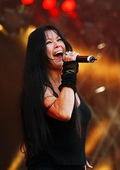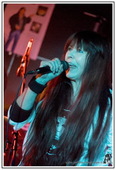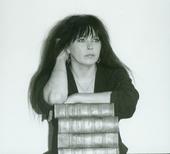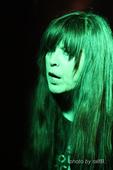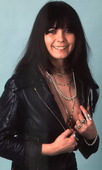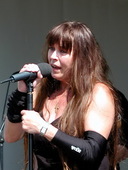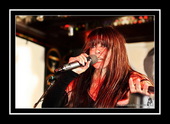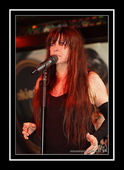Jutta Weinhold
Heavy Music Is A Man's World
15.04.2011
Архив интервью | Русская версияThe German scene has always been rich in beautiful ladies playing heavy music – Doro Pesch and Sabina Classen are just two names that come first to the mind of any metalhead. But yet before these two singers started their careers, there was another lady rocking German stages, and basically she still does it after all these years. Her name is Jutta Weinhold, and she is best known for fronting two heavy metal bands in the late 80s and early 90s - Zed Yago and Velvet Viper. Some of you may have also heard her later solo works, as well as two albums which her band Weinhold released in the 2000s. What very few people know is that even before Yed Yago’s first album came out, Jutta had nearly 20 years of experience in music. In this interview, we tried to make an overview of this singer’s career. Probably it’s not so extensive as we would like it to be (Jutta chose to answer via e-mail, and that, of course, puts some restrictions), but it’s still a very interesting insight into the life of a person who’s played music all her life…
Let’s speak about how it all started for you. Where were you born? What can you say about your childhood? What or who influenced you to be a singer?
I was born 1947 in the countryside outside of Mainz. My parents are vine farmers. I joined a school band in 1963, but my professional career started 1969 with the musical “Hair”. Itg was followed by “Jesus Christ Superstar”, where I performed until the end of 1973. Those days I lived in Munich and became a part of Amon Düül II for a French tour and some open air festivals.
How did you like singing in “Hair” and “Jesus Christ Superstar”? Did it help you as a singer?
It was a great experience for me and my first step to become an artist.
You said in an interview that after you joined “Hair” you became a very convinced hippie. Looking back at it from today’s standpoint, what do you think of the hippie culture of the 60s in Germany?
I tell you, it was a real great time, my own “cultural revolution”, the first time I heard all those great musicians like Jimi Hendrix, Janis Joplin, Led Zeppelin etc. That was a major influence for my life.
Please tell us about your collaboration with Udo Lindenberg. He became popular in Russia after his duet with famous Russian female pop-singer Alla Pugacheva, but that was much later than you worked with him. Did you record any stuff with Udo? What kind of music did you sing with him?
I went to Hamburg in 1974 and started to sing in Kaftan Blues Band. Later I formed Jutta Weinhold Band and we played our asses off almost every night in the clubs. At this time Hamburg was the top spot for rock music. Udo came in one night and wanted to play the drums for the encore. He asked me if I would like to join the crew for his tour 1976. That tour was “a party without end”.
What can you say about your participation in Amon Duul II? How substantial was your contribution in this band? Did you really like this music or it was just a chance to get some popularity?
Amon Düül was my first band experience. Crazy, nice guys. Frank Zappa said about them, “Overpowered, but unrehearsed”.
Your first solo single came out in 1974. What are your best memories about that single? How did it happen that you started your career as a solo artist?
In the moment I did this single recording I knew exactly what I did not want to do. I wanted to be become a band member and play kick ass rock 'n' roll. The first LP was recorded with the guys from Udo's Panik-Orchester. The second album was made with the musicians of Lucifer’s Friend. This record gave me a little popularity, as well as the 3 years I spend with Udo on the road. Successful? No, not really. I never had a chart breaker.
What can you say about the German rock scene at that time? It seems you were the very first female singer on it.
There where not many other females at the time. The German rock scene was successful as everybody spoke about German krautrock.
Your involvement in the punk band Breslau in the early 1980s gained you a lot of bad press, even though you were never a member of that band. But if we leave the political and lyrical aspects aside, were you interested in punk music at that time? The reason behind this question is that punks and hippies usually didn’t like each other that much, and you were a hippie in the late 1960s…
The music scene is constantly changing and punk at that time sounded interesting to me.
How did you get to know Alex Parche, guitarist of Breslau and later a solo artist? Why did you want to sing in German with this band?
I got an offer from EMI to join Breslau, which was a project of Alex Parche. Breslau was heavy and Alex was a great guitar player. EMI needed a singer to finish the production, cause they where not satisfied with the original singer in the band. This offer I could not refuse that time. We were very surprised about the political stream the press put us in. We all had nothing to do with fascists. That was a real bad experience for me.
Now female singers are common in rock and metal music industry, but I think it was very hard to get recognition being a woman at that time. Did you have any issues with the public, record labels or promoters because of your gender?
You know, rock music itself is hard, because cause pop music leads the charts. Naturally hard and heavy music is a man's world. The thing that really bothers me is that the guys are real conservative about women in rock. You have to be more than good to gain some respect.
It’s very interesting that the German metal scene has always been full of women – Doro, Sabina Classen, Gudrun Laos, Joal, etc. Would you say that it was you who paved the way for them? Do you feel any responsibility for them?
No, not really. Everybody is doing their own business. There is not much in common among us.
Your early albums (judging by the songs like “I Don’t Wanna Be a Lawyer”) sounded more like rock and later you turned to heavy metal. How did it all happen? What drove you to play much heavier music?
I just wanted to make stronger music. I wanted to write something else than common rock 'n' roll, I wanted to have lyrics based on poetry and fantasy with literature themes, and for these words I needed hard and heavy music.
Tell me about the earlier days of Zed Yago. How did you form this band, and how did you come up with the namesake character?
I created the figure Zed Yago in 1985. She was the daughter of the Flying Dutchman (see Richard Wagner’s “The Flying Dutchman” opera – ed.). It was my baby and I lost it.
The story of Zed Yago is told on the albums of Zed Yago and Velvet Viper, and in their lyrics Zed Yago (the character) went through a lot of challenges – Trojan War, Kamelot of King Arthur, etc. Can you retell us the subject of her traveling?
She came on earth to search the lost fantasy, because without fantasy the soul will die, and without soul mankind is condemned to die. She started her journey in the twilight zone, and her quest leads her through all the sagas, legends and myths in search for fantasy.
You mentioned that you wrote the book “Die Tochter des Fliegenden Holländers auf der Suche nach der verlorenen Phantasie”. Does it have any relation to Zed Yago’s story?
Sure, the lyrics I wrote for Zed Yago and Velvet Viper are the basis for the story. The book explains the lyrics in much more detail. It's a real fantasy story.
Are you still in touch with drummer Bubi the Schmied and bass player Tatch, who played with you in the original Zed Yago line-up? Do they still play in any bands?
Bubi lives near Hamburg, and as far as I know, he is a member of a rock band. Besides, we are Facebook friends. Tatch lives in Berlin, and I don't know what he is doing.
How did it happen that you didn’t own the rights to the name of the band that you put together? Why did the other band members fight for that name if they didn’t continue using it in the 90s anyway?
I’ll try to make it short: but actually it's a very long story. My mistake was that the name Zed Yago was out of my copyright. I did not care for the exclusive copyright. After the band split the name belonged to the majority and that was three members of the band. They now have the name, but not the soul. When I lost the name I formed a new band named Velvet Viper. I wanted to keep going. Not only there were contracts for records and shows, I still had so many stories, and I didn't want to lose my quest for fantasy.
Velvet Viper was a continuation of Zed Yago both musically and conceptually, but it was never really successful. You even said that you never played live as Velvet Viper. Why did this band never really take off? Musically albums of Velvet Viper are great, and “The 4th Quest for Fantasy” (1992) for me is your best album in terms of production!
Good question, next question.... I don't know. It didn't turn out that way. I really liked Velvet Viper but maybe the stars were not bright enough. It's like: if the problems show up, everybody takes hands off you, and the way down is a lonely path.
With Zed Yago and Velvet Viper you used quotes from Goethe and Schiller and parts of Richard Wagner’s music. Did you try to revive the spirit of classical German culture?
No, actually it was not the German culture, more the European culture. My aim was to get away from copying American bands.
In Velvet Viper you worked with guitarist Roy Last. Please tell me about him. I know he had his own band, but I’ve never heard it. What is he doing at the moment?
Poor Roy Last, he died a couple of years ago from a heart attack.
Your solo career includes a lot of albums in different styles – from acoustic stuff with Akustik Randale and melodic rock on the “To be Or Not…” album (1994) to heavy stuff on “Read Between The Lines” (2010). Which album is your favorite? What music can you call perfect for you now?
I like every album. I'm not objective to point one out. Akustik Randale is an unplugged project with songs of my youth that had “spirit”. Songs from the time where every boy had long hair, and there was love, peace and passion around. In 2004 I started a band called Weinhold, and its two CDs “From Heaven Through The World To Hell” (2004) and “Below The Line” (2006) are heavy stuff. “Read Between The Lines” is a cross section of my musical life.
In the late 2000s you also sang with Krautrock band Jane. What can you say about this band and its music?
Werner Nadolny's Jane (this is how the band is called after the death of its leader Peter Panka – ed.) started a project called “Rocklegendenband” and Geff Harrisson (ex King Ping Me) and myself joint the band as “special guests”.
You did a lot of backing vocals for different bands (Helloween, Metalium, Not Fragile). Do you like that kind of job? What are your best memories about those singing sessions?
We all know each other. And if somebody needs help, if somebody needs a strong heavy voice, they sometimes ask me. These sessions are always fun. You meet friends and colleagues while talking about the old days.
Weinhold folded after two albums, just as Zed Yago and Velvet Viper did before. Is there any “mystery” that never lets your bands record their third album?
Mystery - I must think about it. But Weinhold is actually still alive. In fact, it's more because of some realistic reasons such as financial problems. When you have no support of the business you just can't go on.
What do you think about Zed Yago’s revival in the mid-2000s? Do they still have the right to use this name without your participation after all these years?
I don't think about them. They have the name, but not the soul and spirit of Zed Yago. My Zed Yago is dead.
Your career is full of highs and lows, usually in totally unexpected moments. How much of it would you like to change, if you had the opportunity to do so? Would you call your career in general ‘enjoyable’ or ‘successful’?
I would wish to have better knowledge of human nature. My biggest failure was to choose the wrong people for Zed Yago. I still can sing what I like to sing and, what’s most important, there are people who like it. I think this also means being “successful”.
What kind of music do you listen to at the moment? Do you follow new developments in rock and metal, or do you prefer classics?
My favorite at the moment is Them Crooked Vultures.
You said you’re working on some new material. How can you describe it? When will you release a new album?
We have just produced five songs for the upcoming book ”Die Tochter vom Fliegenden Holländer auf der Suche nach der verlorenen PhantaSIE”. These are five titles from the early Zed Yago days re-recorded and sung by the “original” voice. An old friend of mine, Michael Wagener from Nashville, did the final mix.
Please tell a few words for Russian fans!
Music is always the best, the best, the best. Forever! Rock on with love and peace,
Jutta
Jutta Weinhold on the Internet: http://www.jutta-weinhold.com/
Konstantin “Hirax” Chilikin
April 7, 2011
(с) HeadBanger.ru
